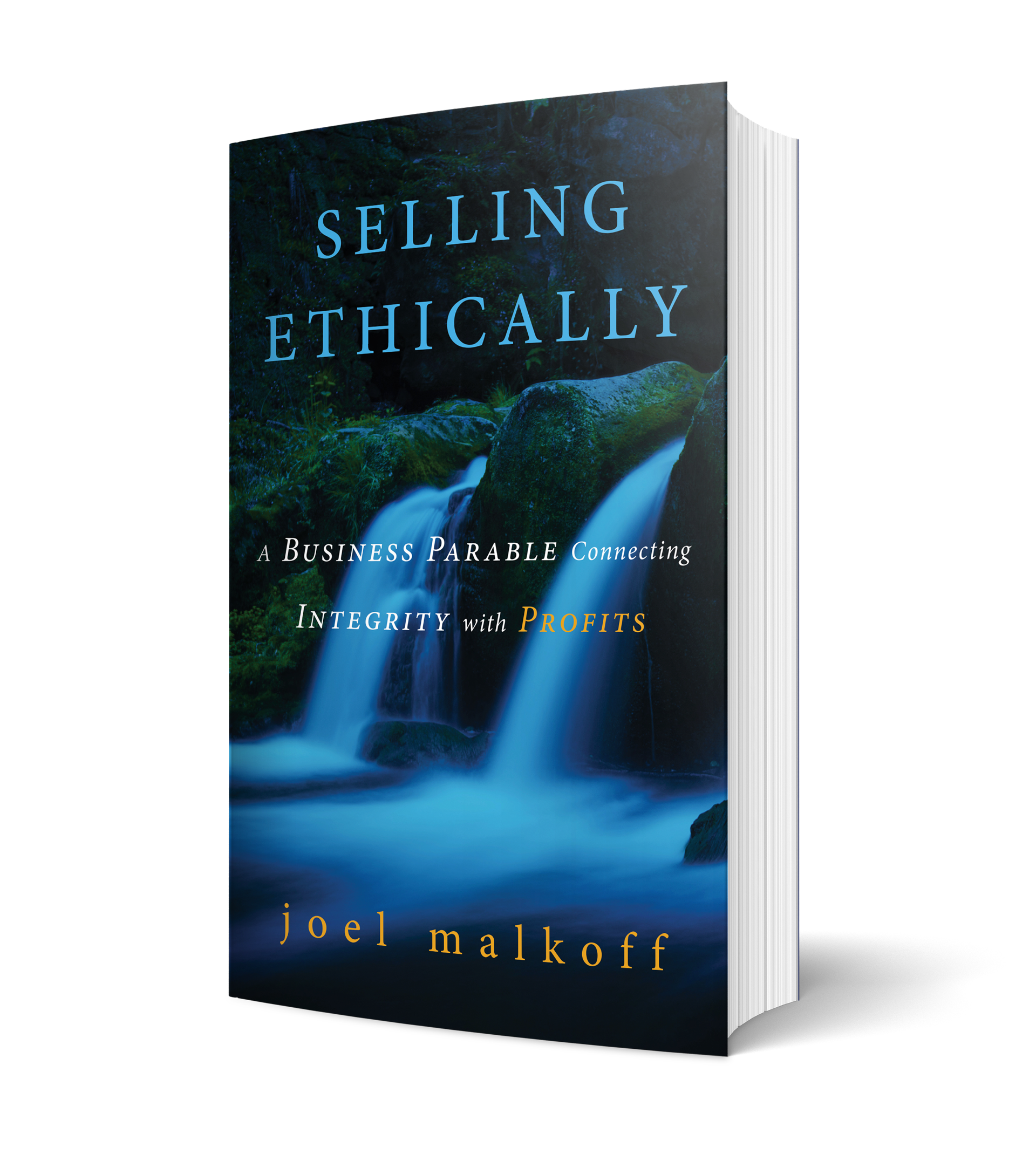About Joel Malkoff
My name is Joel Malkoff. Over the course of my 45-year career as a business executive and entrepreneur, I’ve generated more than half a billion dollars in sales. I’ve worked for large corporations, small companies, and started three businesses. My expertise is in executive management, sales, and marketing within the medical and scientific research community.
I just published my debut book, Selling Ethically: A Business Parable Connecting Integrity with Profits. I chose to write a business parable because storytelling is a great way to learn and remember principles to live by. It chronicles my business-life journey: the successes and failures, ethical and unethical decisions, and years of steep challenges. I don’t consider myself a hero, but my story is portrayed as a hero’s journey, a transformative tale of life’s ups and downs.
I chose the title Selling Ethically to clearly describe it as a book about selling and sales ethics rather than general business ethics. The subtitle, A Business Parable Connecting Integrity with Profits, highlights the alignment between integrity and business success. There’s a powerful and surprising link between sales ethics and profits. I’ve studied and applied business ethics for decades, and I’m passionate about showing others how ethics, when applied properly, can increase sales and profits and grow your business.
You can find me online at TheEthicsGiver.com
LinkedIn: @JoelMalkoff | Facebook: @TheEthicsGiver
Why Did You Become an Entrepreneur, Speaker, Author, Etc. in the First Place?
I have a passion to spread the benefits of sales ethics, and I also believe that it is one of my purposes in life. My background is in sales and marketing; my expertise is in buyer/seller relationships. I have studied and applied business ethics for decades, and I enjoy showing how ethics, when applied properly, can increase your sales and profits, and grow your business. I have a strong desire to transmit ethical knowledge to the business community.
How Do You Deal With Fear?
I consider most of my fears and worries ungrounded and lacking real substance. They appear in my times of weakness and doubt.
How Do You Deal With Rejection?
I consider rejection a step on the way to success.
What’s the Name of Your Company? What Exactly Does Your Company Do, How Do You Help People?
Today, I serve as the general manager and vice president of a successful company, Kent Scientific Corporation.
My company manufactures and sells medical and scientific products to the research community worldwide. In the midst of the unprecedented COVID-19 pandemic, we provide scientific testing equipment and support the research scientists around the world working to discover a cure and vaccine for this deadly disease.
Name One of the Biggest Challenges You Have Faced and How Did You Overcome It?
I’m challenged every day to make business decisions that reflect honesty and integrity—fighting the constant battle to achieve business objectives in a marketplace where unethical behavior can easily go unchecked.
By learning and practicing business ethics, such as honest selling and truthful advertising, I’ve built strong customer relationships, sold more products and services through customer referrals, and increased profit margins. By creating a trustworthy corporate image and helping employees meet the highest standards in ethical behavior, I’ve provided corporate stakeholders with long-term profits, exponential sales growth, and high market value.
One colossal challenge is educating salespeople and business owners about the real benefits of sales ethics. I’ve found that most businesspeople either don’t know or don’t internalize the following three facts:
First, people don’t believe that business ethics will generate profits. They feel that ethical standards are an unavoidable cost of maintaining a good corporate image. Sure, businesspeople believe that a good reputation may increase sales through expensive public relations and social media campaigns, but profit generation is questionable.
Second, many people know that their business ethics and personal ethics should be the same, but they’re less diligent about ethical business practices. For instance, a person may cheat a large corporation because he or she thinks the business can afford it.
Third, from a spiritual viewpoint, people are answerable to a higher power. Your soul was brought into this world to do good. Business is the perfect God-given testing ground to improve your ethical behavior.
What Piece of Advice Do You Wish Someone Had Given You at the Start of Your Career?
I wish I’d been taught to sell with integrity. The following three principles would have helped me when I started my career:
- Be honest and have sales integrity.Your business ethics should be the same as your personal ethics; there should be no difference.
- Conduct business with the spirit of the law in mind.Go beyond the letter of the law and provide your customers with the best solution for their needs, even if it doesn’t yield an immediate sale. Your business relationships are long term.
- Always provide full disclosure to potential customers.Your motto should be “let the seller beware” rather than “let the buyer beware.” Transparency builds customer trust and company profits.
It also would have been beneficial to have learned these five ethical sales practices:
- Have empathy. Truly understand the buyer’s needs and intent. A salesperson shouldn’t be self-centered and focused only on selling.
- Be honest. Provide full disclosure of your product offerings, including possible limitations regarding the buyer’s requirements. Don’t take a hard-sell approach of delivering partial truths or hiding product defects.
- Be a problem solver. Find solutions to a customer’s problems by softly probing the customer’s needs and pain points. A salesperson should not hard sell products or services with no regard for the customer’s needs and problems.
- Act as a consultant. Be a true partner in the sales process and help your customer achieve his or her goals. A salesperson shouldn’t manipulate the buyer through fear, false scarcity, baiting and switching, slandering the competition, or other dubious selling techniques.
- Have sales integrity. A soft-sell approach still needs to be persuasive. Your goal, as always, is to make the sale! Your code of ethics, honest actions, and caring manner will save the day. A salesperson needs to sell ethically, satisfying the customer by providing the right product or service.
Who Are Your Biggest Influences and People You Admire and Why?
I’m most grateful to the authors of the books I treasure. Their words enrich my soul and allow me to learn about myself and the world around me. My library holds millennia of knowledge and wisdom. My books let me hope and dream.
I’ve had several excellent business mentors in my life. One of them was my second sales manager in the medical device business, Alan Polish; he was my managerial mentor. Alan provided a wealth of hands-on experience and practical wisdom.
Name a Person Who Helped You Along the Way?
First and foremost, I must thank God, to whom I owe everything. God has guided me and given me divine insight. I also want to thank my wife, Lynn, who is the reason for my success. Everything good and true in my life is because of her.
What Do You See as Your Greatest Success in Life, So Far?
From a business perspective, my greatest success is my ability to grow other people’s businesses through proper, ethical selling and sales management techniques.
I’d love to know that Selling Ethically made a significant difference in the world. To know that buyers will no longer fear sellers, and sellers will no longer mislead buyers. To know that sellers will genuinely believe that ethics is “smart business.” To have people apply the golden rule of treating others as they wish to be treated—in both business and life. To have goodness and equality in the buyer-seller relationship. And to make the world a better place.
What Book Would You Recommend and Why?
Early in my career I read Og Mandino’s business parable, The Greatest Salesman in the World. This simple, short book clearly defines the principles to be successful in business and life.
What’s a Personal Self-Talk, Mantra, Affirmation or Self-Belief That Contributes to Your Success?
One of my guiding principles in business is to turn lemons into lemonade.







